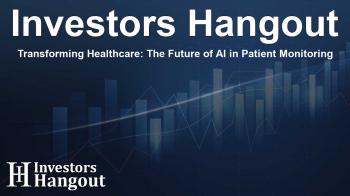Transforming Healthcare: The Future of AI in Patient Monitoring

The Rise of AI in Remote Patient Monitoring
In recent years, the realm of healthcare has been revolutionized by the integration of artificial intelligence (AI), particularly in remote patient monitoring (RPM). The urgency for effective healthcare solutions has spurred significant advancements. Chronic illnesses like cardiovascular diseases and diabetes are on the rise, impacting millions globally. AI in RPM seeks to address these challenges by facilitating real-time health monitoring and personalized care strategies.
The Impact of Digital Health Innovations
As AI technology progresses, many healthcare professionals now have access to a wealth of data that enables them to deliver more efficient care remotely. This shift is empowered by wearable devices and connected sensors capable of tracking vital signs and detecting abnormalities before they escalate. The proactive nature of these systems allows healthcare providers to intervene earlier, minimizing hospital visits and optimizing chronic disease management.
Boosting Care Delivery with AI
The core mission of integrating AI into remote monitoring systems is to improve patient outcomes while reducing the burden on healthcare providers. AI algorithms analyze data from patients consistently, ensuring that treatments can be adjusted instantaneously as conditions change. By focusing on individual patient care, AI can enhance treatment accuracy, adapt to specific health trends, and cater to the unique needs of each patient.
Growing Demand for Remote Monitoring Solutions
Amidst the global emphasis on healthcare innovation, the demand for AI in RPM has surged. The potential of these systems to deliver timely and tailored healthcare solutions has made them increasingly popular. As more patients seek convenience in managing their health from home, companies that provide these AI-driven solutions are experiencing significant growth.
Key Players in the AI in RPM Market
An array of companies is making headway in the AI in RPM sector, contributing to this rapid evolvement. Industry giants like Medtronic, Koninklijke Philips N.V., and Siemens Healthineers lead the charge. Their commitment to innovation ensures they maintain a competitive edge, continually refining their technologies to integrate advanced features that streamline patient monitoring.
Collaborations Driving Innovation
Strategic partnerships have proven to be a catalyst for innovation in this sector. For instance, when Medtronic joined forces with various tech-driven healthcare providers, they reinforced their commitment to enhancing patient monitoring services. These collaborations aim to bridge gaps between traditional healthcare practices and modern technological advancements.
Market Trends and Projections
Looking ahead, the AI in remote patient monitoring market is poised for an impressive trajectory of growth, with projections indicating it may exceed USD 13 billion in the next decade. This growth will likely be driven by advancements in sensor technologies, artificial intelligence capabilities, and increased 5G connectivity, thereby improving the efficiency and reach of RPM systems.
Challenges in Implementation
Despite the myriad benefits, the implementation of AI in remote patient monitoring is not without hurdles. Issues such as data privacy concerns, regulatory challenges, and interoperability must be addressed to foster broader acceptance. Ensuring that sensitive patient information remains confidential is paramount for the adoption of these technologies.
Healthcare Professionals and Patient Engagement
Healthcare professionals play a crucial role in the adoption of AI technologies. Their engagement is essential for integrating AI-driven solutions into everyday practice. Overcoming acceptance barriers through education and training can yield substantial benefits, allowing professionals to leverage these technologies fully for patient care improvement.
Conclusion: The Future of AI in Healthcare
In summary, the AI in remote patient monitoring market exemplifies the transformative potential of technology in healthcare. By enhancing the way we monitor patient health, delivering timely interventions, and personalizing care, AI could redefine patient interactions with the healthcare system. As these technologies continue to evolve and expand, they promise the exciting prospect of improved health outcomes and enhanced quality of life for patients worldwide.
Frequently Asked Questions
What is remote patient monitoring?
Remote patient monitoring refers to the use of technology to monitor health data of patients outside conventional clinical settings, typically using wearable devices.
How does AI improve remote patient monitoring?
AI enhances RPM by enabling real-time data analysis, predicting potential health risks, and facilitating timely healthcare interventions.
What are the key benefits of AI in healthcare?
Key benefits include improved patient outcomes, personalized care, reduced hospital visits, and increased efficiency for healthcare providers.
What challenges does the AI in RPM market face?
Challenges include data privacy issues, regulatory hurdles, and the need for interoperability across different healthcare systems.
Which companies are leading the AI in RPM market?
Some leading companies in this space include Medtronic, Koninklijke Philips N.V., and Siemens Healthineers, among others.
About The Author
Contact Dominic Sanders privately here. Or send an email with ATTN: Dominic Sanders as the subject to contact@investorshangout.com.
About Investors Hangout
Investors Hangout is a leading online stock forum for financial discussion and learning, offering a wide range of free tools and resources. It draws in traders of all levels, who exchange market knowledge, investigate trading tactics, and keep an eye on industry developments in real time. Featuring financial articles, stock message boards, quotes, charts, company profiles, and live news updates. Through cooperative learning and a wealth of informational resources, it helps users from novices creating their first portfolios to experts honing their techniques. Join Investors Hangout today: https://investorshangout.com/
The content of this article is based on factual, publicly available information and does not represent legal, financial, or investment advice. Investors Hangout does not offer financial advice, and the author is not a licensed financial advisor. Consult a qualified advisor before making any financial or investment decisions based on this article. This article should not be considered advice to purchase, sell, or hold any securities or other investments. If any of the material provided here is inaccurate, please contact us for corrections.

